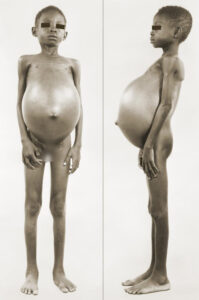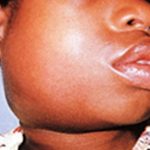Kwashiorkor is a type of malnutrition characterized by severe protein deficiency.
It is one of the diseases that mostly affect children in developing countries, characterized by poverty and food insecurity.
People with kwashiorkor may look emaciated in their limbs but swollen in their hands and feet, face and belly. The distended abdomen typical of kwashiorkor suggests victims are critically malnourished.

Image depicting a child suffering from Kwashiorkor
Health experts say poor sanitary conditions and a high prevalence of infectious diseases can lead to malnutrition in diet which can affect early childhood development. Kwashiorkor can affect all ages, but it is most common in children, especially between the ages of three to five. That early age is when many children have recently transitioned from breastfeeding to a less adequate diet.
A child can easily suffer from Kwashiorkor when he or she is given more carbohydrates than food containing enough protein and other nutrients. Spotting kwashiorkor patients in developing countries has become very rare lately.
One medical doctor with the Korle-Bu Teaching Hospital speaking exclusively with The Ghana Report on why it is uncommon to find Kwashiorkor patients in Ghana and other developing countries said there has been improvement in diet intake over the years.
According to the health expert, mothers in the olden days often fed their children with any meal available at home without taking into consideration the consequences of their actions.
“Now there are many baby foods on the market that contains all the nutrients that are very good for the child’s growth or development”.
“There are some mothers who feed their children with Cerelac, porridge with some milk, others even try to prepare stew or soup for their children and all these help the child to grow very well without any deformity”.
“Well, if you visit any community whereby children at age 3 or 4 are being fed with carbohydrate foods due to poverty, it is likely a Kwashiorkor child may be found in that community”.
Mothers must be appreciated for considering all their antenatal and postnatal advice.
“Normally, pregnant women are advised on the kind of food they should take often to avoid the unborn child from suffering deficiency-related diseases. Moreover, during postnatal, a doctor, nurse or midwife after attending to the child prescribes some foods that the child must be given regularly to promote good health……”.
Another reason the doctor adduced for the reduction in the incidence of Kwashiorkor in developing countries is increased education by health experts on possible ways of avoiding Kwashiorkor.
Health experts often sensitize the public on Kwashiorkor, usually targeting rural areas and small cosmopolitan communities where they organize free health talks on diseases that affect children.
“Sometimes nurses who are deployed to communities for weighing also use the opportunity to educate mothers on the kind of food they should feed their children with looking at their condition”.
Rita Cobbinah, a nurse with one private hospital at Darkuman, a suburb of Accra speaking to The Ghana Report also noted that the fight against Kwashiorkor in a way has been won due to the drastic reduction of children suffering from the deficiency in most developing countries.
“Kwashiorkor is a condition resulting from inadequate intake of protein. We as nurses often educate mothers on how to give nutritious diets to their children to prevent their children from suffering from Kwashiorkor”.
“Due to the intensive education given to the lactating mothers, Kwashiorkor cases are rare of late”, she added.
Additionally, “parents nowadays invest more in their children as they are always ready to sacrifice to buy medicines and other expensive food items that can help their children to grow healthy.”
“Twenty or ten years ago, most parents unlike what we experience today often feed their children with unhealthy food due to poverty. Some mothers even didn’t attend antenatal or postnatal care because they felt it was more for the rich people”.
“Now we see educated and uneducated women trooping in for both antenatal or postnatal treatment and that is a good move. Kudos to our mothers for changing the narrative”.
Rita moreover said the emergence of technology has helped in curbing the issue of Kwashiorkor in most communities.
“We as nurses and parents sometimes are able to research possible ways by which the deficiency can be prevented. Not only Kwashiorkor but there are other diseases we research online to see how we can treat patients suffering from those diseases”, she added.
READ ALSO
















